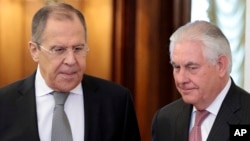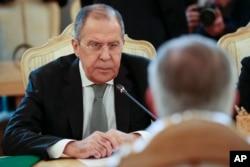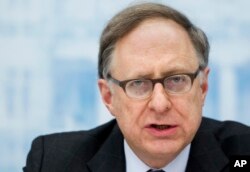The Kremlin says it is "too early yet" to know whether U.S. and Russian relations will improve after hours of contentious talks Russian President Vladimir Putin and Foreign Minister Sergei Lavrov held Wednesday with U.S. Secretary of State Rex Tillerson.
Putin spokesman Dmitry Peskov said Thursday the tone of the Moscow meetings had been "fairly constructive," and reflected a need for the world's two biggest nuclear powers "to maintain a dialog to search for solutions." But he said Putin used the meeting to tell Washington why there is a "deadlock" in their current relations, chiefly in the dispute over last week's chemical weapons attack in Syria and the missile attack ordered by U.S. President Donald Trump in response.
Trump declared Wednesday that U.S. relations with Moscow "may be at an all-time low," a sentiment Tillerson echoed at a news conference after meeting with Putin and Lavrov. Tillerson pointed to a lack of trust between the two countries.
On Thursday, Trump adopted a more optimistic tone, saying on his Twitter account, "Things will work out fine between the U.S.A. and Russia. At the right time everyone will come to their senses & there will be lasting peace!"
Putin told an interviewer on Russian state television on Wednesday that relations between the two countries have deteriorated this year since Trump took office three months ago.
The immediate point of contention between Moscow and Washington is how an April 4 chemical weapons attack that killed more than 85 people and sickened hundreds in Syria occurred. Tillerson said the United States is "quite confident" that it "was planned and it was directed and executed by Syrian regime forces." But Lavrov gave no ground on the Russian claim that the sarin gas assault was either a provocation by Syrian rebels or was triggered when Syrian warplanes struck a rebel munitions depot holding sarin gas.
Call for 'thorough, honest' investigation
"We have insisted that we have a very thorough investigation," Lavrov said at a news conference with Tillerson. "We want an honest investigation."
Russia's top diplomat said Moscow will not "shield anyone" responsible for the attack.
Trump, in an interview, said Putin was partly to blame for the Syrian conflict, now in its seventh year, for backing Syrian President Bashar al-Assad, whom he called an "animal."
Tillerson's trip to Moscow represented the highest-level contact between the United States and Russia since Trump took office in January. The two countries are at odds over multiple issues, including Moscow's continued support for rebels in eastern Ukraine battling against the Kyiv government, and the U.S. intelligence community's declaration that computer hackers, acting on orders from the Kremlin, interfered in last year's U.S. presidential election.
Tillerson said Wednesday Russian meddling in the U.S. election was a serious problem that has been "fairly well established."
Lavrov protested that Russia is the victim of "very slanderous attacks," and added, "I have to say once again ... no one has shown us a single fact. Give us the evidence of Russia's illicit involvement in U.S. politics," Lavrov said, "and we will respond."
'Potential' for improved relations
The U.S. cruise missile attack on a Syrian airbase last week escalated tensions in the Syrian conflict, Lavrov said. He added, however, that he believes Moscow and Washington have "great potential" to improve their relationship.
Tillerson said, "We need to attempt to put an end to this steady degradation which is doing nothing to restore the trust between our two countries or to make progress on the issues of the greatest importance to both of us."
The U.S. envoy said the two countries "have agreed to establish a working group to address smaller issues and make progress towards stabilizing the relationship. So that we can then address the more serious problems. Foreign Minister Lavrov and I agreed we would consider further proposals made about the way forward in Syria, including consulting with our allies and coalition members and we will continue discussions about how to find a solution to the Syrian conflict.”
Alexander Vershbow, former U.S. ambassador to Russia, professed a guarded optimism — with a caveat.
"I think it's a good thing that the Russians and the U.S. have agreed to re-establish the deconfliction line, because it's in no one's interest to have an incident in the skies over Syria that could make a very difficult relationship even more difficult," he told VOA during an interview at the Council on Foreign Relations in New York. "That being said, I'm not sure there's all that much meeting of the minds on what needs to happen to bring about an end to the war in Syria."
Regardless of U.S.-Russian ties, Vershbow, a former deputy secretary-general to NATO, said the April 4 chemical weapons attack precludes any political future for Assad.
"The problem of Assad is still very fundamental. It's not a question of 'we don't like him in the international community,' it's that the Syrian people, after all the destruction he has committed against them — and then even using chemical weapons despite supposedly giving them up — it's just inconceivable that he could be accepted as part of a solution by the people of Syria. So, Russia used to say they're not wedded to Bashar al-Assad, but it looks like they've gotten remarried again. And that's going to be a difficult issue going forward," he said.
"The situation is more difficult today, bilaterally, than it was three, three-and-a-half years ago, and the stakes are higher," Andrew Kuchins, a Eurasian affairs expert with the Washington-based Center for Strategic and International Studies, told VOA's Russian Service, referring to Syria's largest chemical weapons attack of August 21, 2013. "But I think that sort of structural dynamic [of U.S.-Russian diplomatic ties], and therefore the possibility of a way out, is still there."
Putin: 'Where's proof against Syria?'
Putin discussed the general decline in U.S.-Russian relations with the state television channel Mir before his meeting with Tillerson.
"It can be said that the level of trust at the working level, especially at the military level, has not become better, but most likely has degraded," Putin said. "Where is the proof that Syrian troops used chemical weapons? There isn't any. But there was a violation of international law. That is an obvious fact."
Trump had praised Putin as a strong leader during his long campaign for the White House, but on Wednesday he highlighted the Russian president's role in the Syrian civil war. "Frankly, Putin is backing a person that's truly an evil person," Trump said, referring to Assad. "I think it's very bad for Russia. I think it's very bad for mankind."
Misha Gutkin of VOA's Russian Service contributed to this report.







